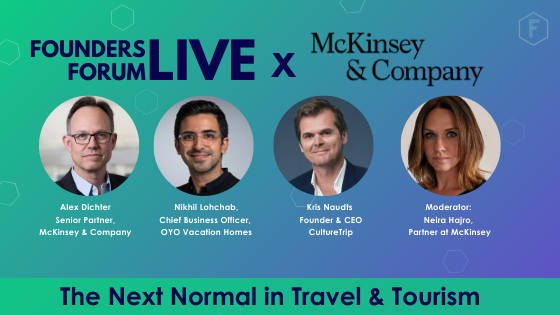Last updated on April 13, 2023
On April 17th, Founders Forum hosted the first edition of FF Live, a new virtual event series bringing the content and conversations from the Founders Forum community to life in a new and engaging format. Travel entrepreneurs and industry CEO’s came together for the first online event in the series, centred on The Next Normal in Travel & Tourism, hosted in collaboration with 2020 Knowledge Partner McKinsey & Company.
The discussion was led by panellists Kris Naudts, Founder & CEO, CultureTrip; Nikhil Lohchab, Chief Business Officer, OYO Vacation Homes; and Alex Dichter, Senior Partner, McKinsey & Company, discussing the implications of the current COVID-19 crisis on travel, one of the industries most heavily affected by the current global health crisis.
Neira Hajro, Partner, McKinsey & Company moderated the discussion, drawing on questions posed from the +150 attendees, including Alex Cruz, CEO, British Airways and André Schwämmlein, Co-Founder, FlixBus who offered their perspectives on current challenges and what’s in store for aviation and mobility respectively. While we observed the Chatham House Rule for this event, below is a recap of the main themes that emerged from the discussion.

|
1. This crisis is forcing rapid adaptation and innovation in travel and tourism
No industry in living memory has had to adapt or innovate as rapidly as travel and tourism presently: while previous crises have seen global travel decrease in the range of 3-4%, the current ~85% drop is totally uncharted territory.
Though the impact is ubiquitous, local and cyclically dependent fulfilment businesses are likely to be hit the hardest, existing at the end of a chain where value is created and converted online, but fulfilled physically.
However, providers are already thinking about the return in demand as, while restrictions exist for suppliers, this is essentially a negative demand shock.
“We really do not know what the psychology of a citizen or consumer will be in 3 months from now”
Travel and tourism companies are now playing out scenarios of where and how demand will manifest once it starts to return. Given the current widespread uncertainty, companies are preparing for a number of potential eventualities for the travel sector and the lasting impact on consumer psychology remains unknown.
2. Travel will undergo profound changes, some permanent
Industry professionals must be ready to adapt and prepare for a return to the ‘new normal’ by ensuring they are the absolute best operators from a cost, process, and customer perspective. In the same vein, it is necessary for companies to plan for future pandemics by collecting data now and maintaining cash preservation for future liquidity.
“The current situation is not an opportunity for companies to change; it’s an obligation”
Beyond this, airlines and other travel providers will have considerable pressure put on them to develop protocols to make consumers and governments comfortable with travelling and restore confidence.
Whilst this may provide short-term comfort for passengers, many of the proposed measures appear neither sustainable nor effective in the long term.
3. Safety will become a brand differentiator
When countries begin to lift the virus-imposed restrictions, many travel companies will be forced to make operational changes in the name of safety, which will likely become brand differentiators as consumers cautiously return to activity.
Hoteliers and accommodation providers have already introduced new cleaning protocols and sanitation guidelines to reassure guests and establish a precedent early. These include widely available hand sanitizer, regular communication of cleaning schedules, and the use of paper wrappers on doors to indicate when rooms have been cleaned.
Similar measures have been suggested for airlines and buses to block middle seats, adopt new technologies, and introduce temperature screenings or potential ‘vaccine passports’ at airports and stations. For many of these measures, the perceived psychological effects of these safety precautions will outweigh any tangible medical benefits. Providers must therefore ensure there is evidence to support the measures taken so that changes are truly effective in safeguarding travellers.
Some of the measures will have long-lasting impacts, similar to the now-familiar protocols used at airport security checks which have prevailed since September 2001.
4. Governments cannot be relied on for cross-industry standards, and travel operators must step up to create a consensus
State impositions on travel practices have been varied, idiosyncratic, and often confusing to date, and as such governments cannot be relied upon to develop international, cross-industry standards regarding health and safety measures across hospitality and travel.
Industry players must therefore work together towards standardisation and look to governments for support, rather than vice-versa.
“If governments can’t be trusted to standardise a plug socket internationally, how can we expect them to coordinate over airline safety measures”
As nations shut down, many planes were turned around in mid-air, and travel providers should be front footed so as to be prepared for little or no warning of either relaxed restrictions or the potential for further lockdowns in coming months.
5. This isn’t an ice age – activity will return, but improvements will be asymmetrical
Individuals are currently valuing what is inaccessible – visiting other countries and destinations, and there have been early signs of recovery in traffic on travel websites as consumers are looking into inspirational escapist content, signalling a longing to return to travelling once global restrictions are lifted.
There have also been nascent shoots of recovery in China and East Asia, where hotel occupancy rates have recovered among younger travellers, highlighting the asymmetry of recovery.
“If there’s life, there’s travel” – Barry Diller
Urban hospitality is likely to recover considerably more slowly than less densely populated locations, as infection risk remains higher in major cities, and travellers are likely to skew younger as older relatives remain more cautious.
Similarly, ground travel in the form of cars, trains, and buses is likely to recover much more quickly than air travel as consumers remain wary of airports and the close proximity of aeroplanes.
Finally, H2 2020 will likely be a relatively healthy period for domestic tourism (versus international travel), as tourism boards re-allocate resources towards attracting domestic tourists, consumer spending power is reduced, and international movement is either prohibited or discouraged.
—
FF Live is the home for all of Founders Forum’s virtual events, including fireside chats, brainstorm sessions, Q&As, panels and founder-focused advice. Run independently and as collaborations with our partners, FF Live seeks to recreate the magic of Founders Forum, wherever we are in the world. To keep up with the FF Live series, subscribe to Founders News for weekly updates and the latest tech news delivered to your inbox.
 All Posts
All Posts


